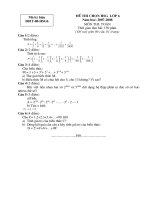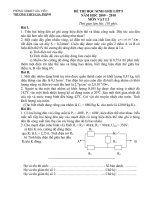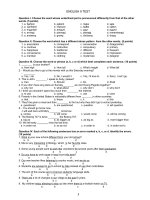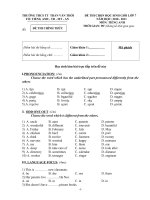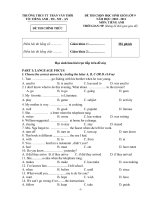đề thi HSG huyện (có đáp án - hay)
Bạn đang xem bản rút gọn của tài liệu. Xem và tải ngay bản đầy đủ của tài liệu tại đây (84.38 KB, 3 trang )
ENGLISH 9 TEST
Question I. Choose the word whose underlined part is pronounced differently from that of the other
words. (5 points)
1. a. fashion b. patient c. make d. sale
2. a. confident b. improve c. bottle d. cotton
3. a. mountain b. amount c. your d. pound
4. a. arrived b. planned c. planted d. remembered
5. a. answers b. grows c. chickens d. drops
Question II. Choose the word which has a different stress pattern from the other words. (5 points)
1. a. association b. correspond c. conversation d. disappointed
2. a. continue b. instruction c. compulsory d. primary
3. a. happiness b. traditional c. different d. frequent
4. a. convenience b. centuries c. occasions d. impression
5. a. member b. clothing c. modernize d. designer
Question III. Choose the word or phrase (a, b, c or d) which best completes each sentence. (10 points)
1. ________ is your brother?
a. How high b. How tall c. What’s height d. What tall
2. - Would you like to go to the movies with us this Saturday evening?
- ________.
a. Yes, I do b. No, I wouldn’t c. Yes, I’d love to. d. Sorry. I can’t go.
3. This is John. ________ I speak to Andy, please?
a. Can b. Should c. Do d. Shall
4. If you don’t have any plans on Sunday________ we visit Huong Pagoda together?
a. why not b. what about c. why don’t d. why don’t
5. I think you shouldn’t spend too much time ________ the Internet.
a. to use b. using c. use d. uses
6. Poverty in the United States is noticeably different from ________in other countries.
a. that b. those c. it d. this
7. They’ll be given a meal and then ________ to find out why they didn’t go to school yesterday.
a. questioned b. are questioned c. question d. will question
8. - You should go home now.
- I will wait here until Mary ________ tomorrow.
a. comes b. will come c. would come d. will be coming
9. The Boeing 747 is twice ________ the Boeing 707.
a. big as b. as bigger as c. as big as d. more bigger than
10. We left early ________ miss the last train.
a. in order not b. so as not c. in order to d. in order not to
Question IV. Each of the following sentences has an error marked a, b, c, or d. Identify the errors.
(10 points)
1. What is your new school different from your old school?
a b c d
2. Mai is very interesting in Biology, which is her favorite class.
a b c d
3. Some young people want to work like volunteers for several years after their graduation.
a b c d
4. Do you have to work more or less hours this term?
a b c d
5. Our new teacher likes listening to country music, and we do so.
a b c d
6. Students are advised to go to school by bike instead of use their motorbikes.
a b c d
7. The aim of this course are to improve students’ language skills.
a b c d
8. There are a lot of changes in our village in the past 5 years.
a b c d
9. My children enjoy allowing to stay up late when there is a football match on TV.
a b c d
1
10. When I last saw Minh, he hurried to her English club and did not have time to talk.
a b c d
Question V. Provide the correct form of the words in brackets. (10 points)
1. My friend had an accident on her way to school yesterday. (Luck), she wasn’t badly hurt.
2. I enjoyed the (peace) atmosphere while I was on my uncle’s farm last summer.
3. Foreign visitors are really impressed by the (friend) of Vietnamese people.
4. We all love his songs. He is a talented (music).
5. Hoi An is a famous town in Viet Nam. It is (frequent) visited by foreigners.
6. Poets often draw their (inspire) from the picturesque countryside.
7. Her mother is very (pride) of her academic results this term.
8. The two cities are (surprise) similar.
9. My new trousers need (short) because they are too long.
10. The doctor said that whatever I did, my cold would last for a few days and then (appear).
Question VI. Choose the word or phrase which best completes each blank in the following passage. (15
points)
The telephone was (1)_____ in 1876 by Alexander Graham Bell, a Scotsman who became a US citizen.
The word 'telephone' had been in existence since the 1830s and had been applied to a (2)_______ of
inventions designed to produce sound.
Bell had become (3)_____ in the possibility of long-distance speech through his work with (4)_____ deaf.
He was twenty-eight and his assistant, Thomas Watson, was just twenty-one when they achieved their great
success (5)_____ 10th March 1876. (6)_______ their long and close association, Bell's first communication by
telephone was not 'Tom, come here, I want you', but ' Mr Watson, come here, I want you'.
(7)______ with excitement, Bell and Watson demonstrated their invention to a US telegram company. The
company wrote to Bell, saying that his invention was interesting.(8)______, after giving it careful consideration,
they had come to the conclusion that it had 'no future'. Fortunately for Bell, others could see the possibilities.
Within four years of its invention, the US (9)_______ 60,000 telephones. In the next twenty year that figure
increased to over 6 million. Today, ninety-three per cent of US homes have a phone, a level of phone
ownership no other nation (10)______ near to equaling. Each US household makes or receives on average
3,516 calls per year, an astonishing statistic.
1. a. made b. invented c. discovered d. done
2. a. number b. figure c. amount d. great deal
3. a. interest b. interesting c. interests d. interested
4. a. a b. an c. the d. no article
5. a. on b. in c. at d. of
6. a. Although b. Because c. Despite d. Thanks to
7. a. To fill b. Filled c. Filling d. Fill
8. a. So b. And c. However d. For
9. a. brought b. had c. were d. took
10. a. comes b. come c. coming d. to come
Question VII. Read the following passage and choose the correct answer. (15 points)
Tokyo is one of the places that you love and hate at the same time. In Tokyo there are always too many
people in the places where you want to be. Of course there are too many cars. The Japanese drive very fast
when they can but in Tokyo they often spend a long time on traffic jams. Tokyo is not different from London,
Paris and New York in that. It is different when one wants to walk.
At certain times of the day there are a lot of people on foot in London's Oxford Street. But the Street near
the Ginza in Tokyo always has a lot of people on foot. And sometimes it is really difficult to walk. People are
very polite; there are just too many of them.
The worst time to be in the street is about 11:30 at night. That is when the nightclubs are closing and
everybody wants to go home. There are 35,000 nightclubs in Tokyo, and you do not often see one that is
empty. During the day, most people travel to and from work by train. Tokyo people buy six million train tickets
every day. At most stations, trains arrive every two or three minutes, but at certain hours there seem to be
enough trains. Although they are usually crowded, Japanese trains are very good. They always leave and arrive
on time. On a London train you would see everybody reading a newspaper. In Tokyo trains everybody in a seat
seems to be asleep, whether his journey is long or short. In Tokyo I stood outside the station for five minutes.
Three fire-engines raced past on the way to one of the many fires that Tokyo has everyday. Tokyo has so many
surprises that none of them can really surprise me now.
I. Tokyo is different from London in that
a. it has a larger population. b. it is a noisy city
2
c. it is more difficult to go somewhere on foot d. it often has traffic jams.
2. When does the writer think is the worst time to go into the street?
a. When the nightclubs are closing. b. At 8:00 a.m.
c. When the train is overcrowded. d. At 11:30 a.m.
3. What does the writer think of Japanese trains?
a. They are very nice and comfortable. b. There are not enough trains.
c. They often run behind time. d. They leave and arrive on time.
4. In Tokyo trains every Japanese in a seat
a. reads a newspaper b. looks like being asleep c. talks with others d. looks out of the window
5. From the passage, we can see that fires break out in Tokyo.
a. quite often b. very rarely c. occasionally d. only several times a day
Question VIII. Finish each of the following sentences in such a way that it means exactly the same as
the sentence printed before it. (15 points)
1. They are going to build a big hotel in our town next year.
- A big hotel ……………………………….………..
2. Taking the train doesn't cost as much as flying.
- Taking the train is …………………………………….
3. It was at Christmas when I last talked to my parents.
- I haven’t ………………………………………………….
4 I haven't forgotten any of the details of what happened that day.
- I still …………………………………………………………
5. Be careful or you’ll hurt yourself.
- If ……………………………………………..………………
6. The train was so crowded that I couldn't get a seat.
- There were so ………………………………………………..
7. "Don't come home late, Jenny!" her father said.
- Her father ……………………………………………………………..
8. We decided to go home when we found that no one was there.
- Finding ……………………………………………………………
9. Nobody has watered the flowers in the garden for many weeks.
- The flowers ………………………………………………………....
10. He couldn’t go to the class yesterday. He wasn’t well enough.
- He wasn’t ……………………………………………………………..
Question IX. (15 points) You’ve just visited your uncle in Ha Noi. Write a letter to your friend about your visit.
The following questions may help you.
- When did you go there?
- Who did you go with?
- What did you do there (visit interesting places, go shopping, buy presents …)?
- How did you feel after the visit?
Note: You must follow the form below:
Date
Dear Lan,
………………………………………………………………
………………………………………………………………
………………………………………………………………
………………………………………………………………
………………………………………………………………
………………………………………………………………
All the best,
Minh
The end
3

